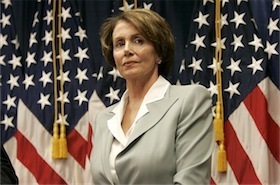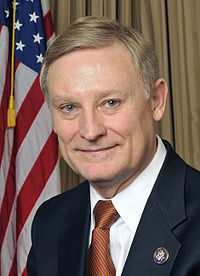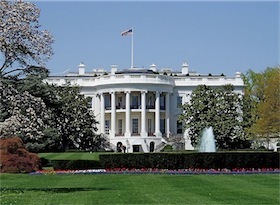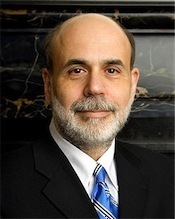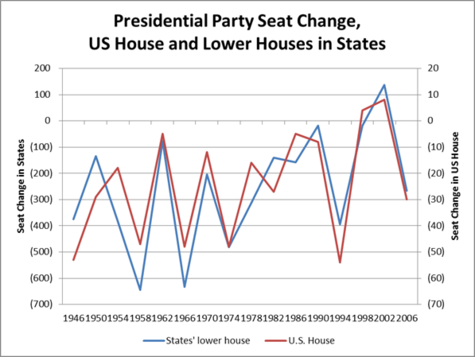Matthew Yglesias's Blog, page 2509
November 4, 2010
Pelosi: No Regrets
I think Nancy Pelosi came out with the right line last night on her tenure as Speaker of the House of Representatives: "No regrets."
Of course it would be a bit silly to have literally zero regrets whatsoever. But the point is the refusal to apologize for staking out a bold, progressive course of action and she was correct to do so. Something's that often goes missing in Washington is the fact that homeless shelters are hardly full of former congressmen. If pushing the envelop on a few issues led to 65 losses instead of 50 losses, then those fifteen guys are going to be fine at the end of the day. If pushing the envelop on a few issues led to several million extra people getting health insurance, that's a different issue.
Beyond the Affordable Care Act, the Pelosi Congress has a number of other significant achievements. That includes the underrated TARP, an important public lands program, a substantial increase in Pell Grants so poor kids can go to college, the Lilly Ledbetter Act that prevented gender discrimination law from becoming a dead letter, hate crimes legislation, an increase in automobile fuel efficiency standards, etc.
I think what will create the most controversy in retrospect is that Pelosi is a climate hawk and insisted on moving forward with the Waxman-Markey American Clean Energy and Security Act that ended up dying in the Senate. That's a bet that obviously didn't work out in the end. But realistically, it's the most important issue of our time and the fact that she was determined to take the best shot she could at getting something done reflects well on her. In fact, out of all the members of congress I've had the opportunity to speak with in Washington Pelosi has always struck me as the one who's best at keeping things in perspective. You don't get to be Speaker without being a shrewd political thinker, but a big part of her shrewdness was not overdoing the political thinking. She always kept her values front and center and made the political thinking subordinate to her substantive mission in politics. The politics, in other words, was a means to an end and the ends she served were important. We need more people like that in DC, not fewer.


Rep Spencer Bachus (R-Alabama) Plots to Weaken Financial Regulation, Strengthen Banks
I think relatively few people understand that one of the principal substantive complaints the new Republican House majority has about Barack Obama is that he's been unkind to the incumbent firms in the financial services sector.
But here's Spencer Bachus, the likely new chair of the relevant committee, firing warning shots on behalf of Wall Street:
Spencer Bachus, a potential Republican chairman of the House financial services committee, has fired the first salvo in a battle with regulators – warning them against harming US banks by curbing their trading activity. [...]
Underlining the change in Congress, Mr Bachus, who as ranking Republican on the committee could replace Barney Frank as chairman of the panel, expressed concern that shareholders of Goldman Sachs and JPMorgan Chase will be hurt because the banks will be less profitable. [...]
"The derivatives provisions in Dodd-Frank alone… as they stand now they're going to take a trillion dollars out of our economy. Think how many jobs that's going to kill," he said.
Rising stars in the conservative media firmament have painted an appealing picture over the past two years of a populist right outraged by allegedly undue entanglement between government and big business and eager to help out the little guy. But this is the reality. The article is via Tyler Cowen who remarks "It is difficult to fathom how that last pararaph can make any sense, other than as fabrication."


Life in the Bubble
The unemployment rate in the actual District of Columbia is a bit above the national average, but most of the movers and shakers live in the suburbs and as Lydia DePillis observes life is sweet for professionals working in the capital of the mightiest empire the world has ever known:
September's unemployment statistics are out, and the numbers for our little corner of the world look fantastic: We've dropped below six percent, thankyou very much! At 5.9 percent, the D.C./Maryland/Virginia/West Virginia Metropolitan Statistical Area has the lowest unemployment rate of any large urban area in the country.
All around the country the places that are doing well have health/education/government work. After DC, the top MSAs are Oklahoma City, Minneapolis/St Paul, and Austin—all state capitols.


November 3, 2010
Endgame
Somewhere we will meet:
— Peter Orszag wants to put Social Security's long-term actuarial balance back on the agenda.
— The old Diamond-Orszag Social Security plan.
— Pension reform lessons from Switzerland.
— The F-You election.
— John Wall was totally awesome last night, and I regret ever having expressed any doubts.
For bipartisanship, it's Radiohead "Electioneering".


Governing from the White House
When I said Barack Obama should respond to the election by moving out of the Senate and into the White House I didn't just mean he should focus on foreign policy more, though I did also mean that. I meant really literally he should try to remove himself from being the focal point of the legislative process and remove the legislative process from being the focal point of his presidency. When people think about partisan squabbling on the Hill, you want them to think of House Speaker John Boehner squabbling with Senate Majority Leader Harry Reid.
When Barack Obama is asked what he thinks about issues, he should speak in terms of broad outlines and objectives. He wants clean energy. He wants long-term deficit reduction. He wants short-term jobs boosts. He wants to invest in reforming education. He wants a broad deal on immigration. He wants to "bend the curve" on health care. He wants his nominees confirmed. If you want to talk about deal-making, go call a Senator.
The point isn't just to free up more time on the Presidential schedule. It's also to shift the focus of the agenda. You want the press to stop asking "what will Obama do to reach out to Republicans?" He's busy! He's not reaching out to anyone! The question to ask is "what are congressional Republicans doing to do reach out to Obama and the thirteen Democratic Senators whose votes they need to pass anything?"
Among other things, I think this approach is more likely to actually produce bipartisan compromise. When Presidents insert themselves into legislative debates, the tendency is for the debate to become more partisan and polarized. Sometimes that's useful, but in circumstances when Republicans have the House and Democrats have the Senate, it means it's not a productive way to get things done.


Cato's Mark Calabria "Warns" That QE2 Might Succeed In Helping the Fed Meet Its Mandate
While Paul Krugman has been warning that a second round of quantitative easing is unlikely to achieve its goal of raising inflation expectations, Cato's Mark Calabria has a bizarre post in which he warns that QE2 might work:
The real impact, and the greatest risk, of QEII is that it changes expectations of inflation. It seems pretty clear that the Fed wants higher inflation than we have now. QEII sends the signal that the Fed will do everything possible to create that additional inflation. QEII also runs the real risk that the Fed ends up "monetizing the debt" – both reducing the political pressure to address our fiscal imbalances as well as undermining the dollar.
This is totally bizarre. The Fed's target is to maintain an inflation rate of around 2 percent. For a while now, the inflation rate has been below 2 percent. One of the goals of monetary policy should be to raise the inflation rate to bring outcomes back in line with the targets. Was inflation ruinously high when Bill Clinton was President? Was it ruinously high when Ronald Reagan was President? And why shouldn't the dollar fall when we're importing so much more than we're exporting?
Getting this stuff right is the key to restoring growth. With inflation expectations back at a healthy level, real interest rates will be more in line with where they ought to be. Firms and individuals will be encouraged to stop hoarding cash (or treasuries) and instead to invest in the real economy. Consumers will buy fewer foreign-made products and our products will be more appealing to foreigners. What's the problem?


Quantitative Easing
In my view, the most important aspect of today's Fed meeting is the statement rather than the bond purchases as such. The statement drives expectations, and driving expectations is the name of the game. They state that currently "measures of underlying inflation are somewhat low, relative to levels that the Committee judges to be consistent, over the longer run, with its dual mandate." That is to say that the FOMC is targeting a level of inflation that's higher than the current level, though the precise target remains a secret.
They further say that the FOMC "will employ its policy tools as necessary to support the economic recovery and to help ensure that inflation, over time, is at levels consistent with its mandate." I take that to mean that they're not engaging in level targeting where they try to have the price level "catch up" with its pre-recession trajectory.
The upshot should be a modest increase in inflation expectations, and thus a modest uptick in economic activity. The reality of modestly elevated inflation should somewhat speed the debt-payback cycle and modestly reduce the real interest rate, both of which can spur economic activity. Consequently, the immediate market response looks to be positive but modest. I think we're seeing here that the Fed understands the basic shape of the problem just fine, but they don't feel urgent about it. FOMC members and federal reserve staff don't spend a lot of time socializing with people in the worst-afflicted demographic groups and thus find themselves uninspired to do anything too bold or risky to help them out.


Only Voters Count
I think this exit poll result is even more striking than the one about the age composition of the electorate:
Now the median American household makes $50,222 so this vote split should generate a pretty even division of the electorate. But 63 percent of voters came from households with above-average incomes. In part that's because two-adult households are more common in the above-average bracket, in part that's because non-voting non-citizens are more common in the below-average bracket, and in part it's because high-income people turn out at higher rates.
This not only partially explains the election results, it shapes the larger political climate. You can't win an election on the basis of the votes of children and immigrants. You need actual voters. And the median voter is quite a bit richer than the median person over and above all the other ways in which higher income people have more political influence.


The Shape of Backlashes to Come
To me it seems obvious that having the 111th Congress press hard to get big things done was the right call, even if it contributed to electoral defeat. This is especially true because as I said yesterday you need to do the analysis at the margin. Losing 65 House seats is way worse than losing zero House seats. But dropping the Affordable Care Act wouldn't have saved 65 House seats. Maybe it would have saved 15. But that's not nearly as big a deal. The reason you try to win elections is it gives you the chance to pass important laws, so saying you want to avoid passing laws in order to slightly reduce your midterm losses seems silly.
So I agree with Ross Douthat that I don't quite get what all the conservative exultation is about:
Politics often gets covered as though the legislative sessions are just a long prelude to the real action of election season. But for all the breathless horse-race coverage, elections only matter to the extent that they produce (or forestall) actual legislation. And where the policies of the United States government are concerned, all the ground the Republicans regained tonight doesn't change the fact that what liberals achieved in Barack Obama's first two years in office was more consequential than any conservative victories in recent memory.
Or I guess I do get what the exultation is about. It's like being a sports fan. The Wizards beat the Sixers in a close overtime game last night and the crowd was loving it. We all know the team's not winning a championship, but it's fun to watch your boys win. So Republicans won big and conservatives are psyched about that. But in policy terms progressives are in way better shape today than we were two years ago when we were flush with "victory" but hadn't actually done any stuff.
What I don't understand is Douthat's effort to introduce more balance into this analysis:
The question is what happens next. If the backlash persists into 2012, if the Republicans get serious about policy, if this cycle's conservative gains are a prelude to conservative legislative successes down the road, then the Democrats' decision to gamble their majority on health care reform may come to look reckless and self-destructive, and the victories of the 111th Congress will seem pyrrhic rather than enduring.
That doesn't make much sense to me. Whether or not the "backlash" persists into 2012 in a way that permits major conservative legislative success in the 113th congress is going to hinge on whether or not Obama gets re-elected. And it's just not realistic to think that legislative tactics chosen in 2009 and 2010 are going to have a meaningful impact on this. Either Obama will succeed in presiding over some decent personal income growth and he'll win, or else he won't and he won't. That's a big deal, but I think it emphasizes the central importance of getting things done when you have the chance.
Meanwhile, I'm still really unclear on what this current backlash is about. Canceling the stimulus that's already phased out? Refraining from cutting Medicare? Complaining about the deficit while refusing to name offsetting spending cuts? "[I]f the Republicans get serious about policy" I would consider that a good thing not a threatening development.


The Madness of Partisan Municipal Elections
I briefly noted this yesterday, but it turns out that state legislative outcomes are highly correlated with House of Representatives elections. For example:
This suggests that swing voters are relying very heavily on some pretty unsound heuristics to decide who to vote for at the state level. The fact of the matter is that the Tennessee State Legislature and the United States Congress deal with some very different issues. To say "I'm fed up with ObamaCare/the Iraq War so I'm going to kick my state senator to the curb" doesn't make any real sense.
And this gets worse the further down ballot you go.
Washington DC is a very heavily Democratic jurisdiction so naturally Republican candidates got crushed across the board in our municipal elections. And they always will get crushed, since people aren't actually considering the candidates they just know that Republicans are bad. The result is that the Democratic primary is the "real" election. But if you look at the general election results, you'll see that a bit less than ten percent of the city seems reliably Republican and a similar quantity likes to vote for the DC Statehood Green Party. The system we currently use in effect disenfranchises these people. I think it's very possible that incumbent mayor Adrian Fenty (who snagged 22% without running or being on the ballot) could have put together a majority coalition of Republicans and Democrats if not for the fact that those Republicans weren't allowed to vote in the primary that sealed his fate.
It would make a lot more sense for DC to do what many other cities do and hold non-partisan elections. You could do Instant Runoff Voting or a two-stage process with a runoff. In general, I'm a fan of parties and partisanship because I think they promote accountability and policy cohesion. But it doesn't make sense to take a party system organized around congressional conflict and apply it to city government. The ideal scenario might be to do something Canada-style and simply have whole different parties at different levels of government. But barring that, I think non-partisan local elections are pretty clearly the way to go.


Matthew Yglesias's Blog
- Matthew Yglesias's profile
- 72 followers


